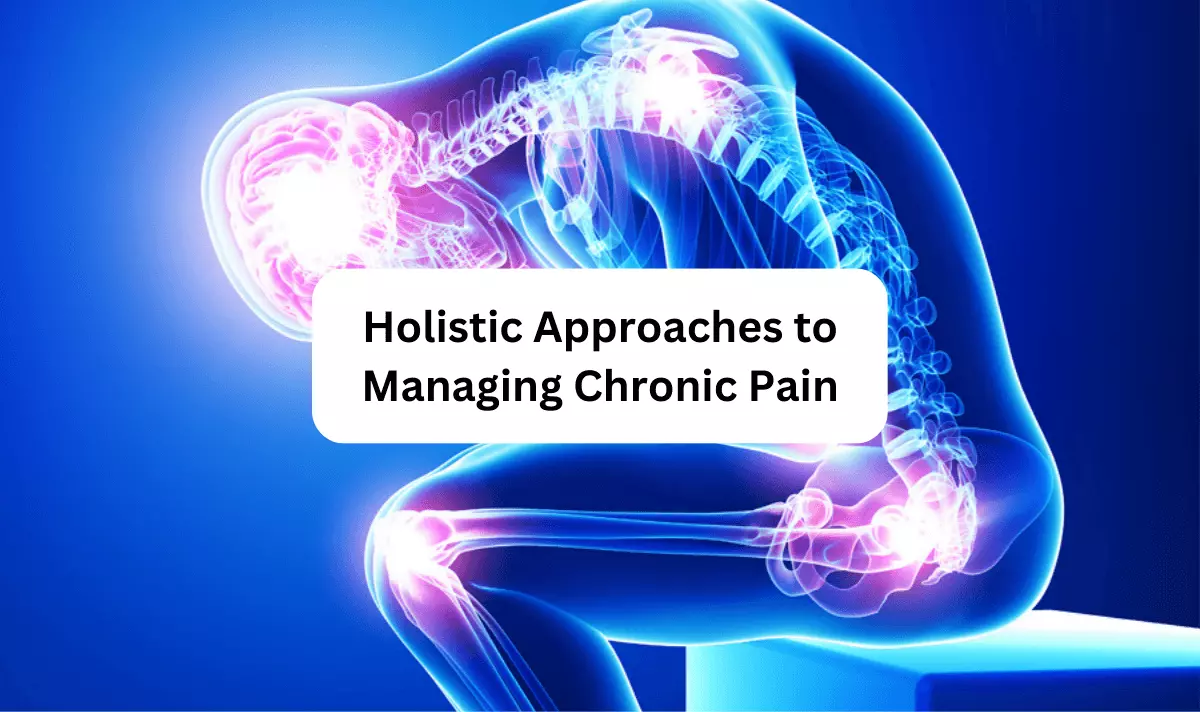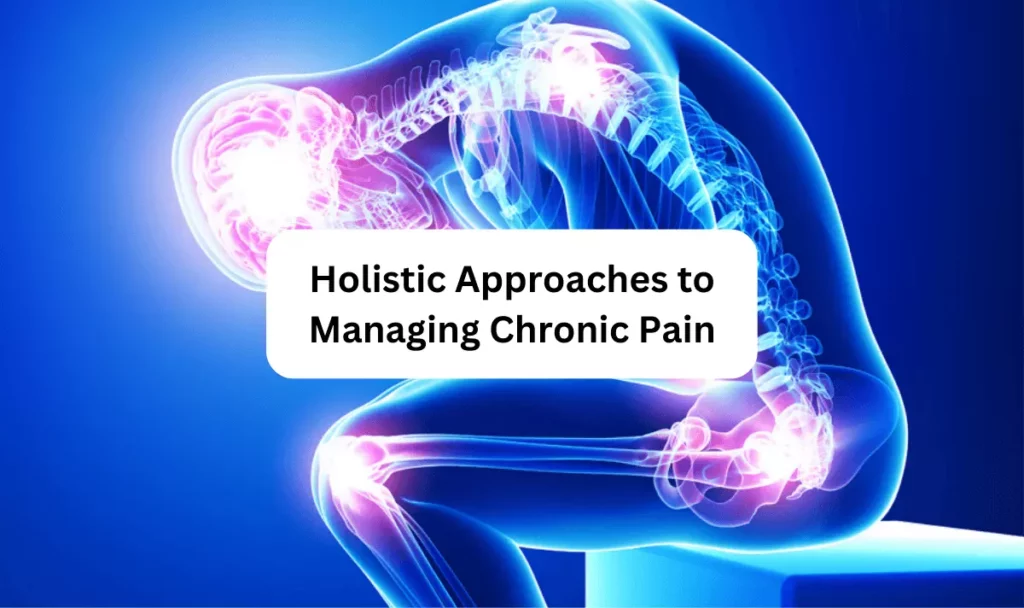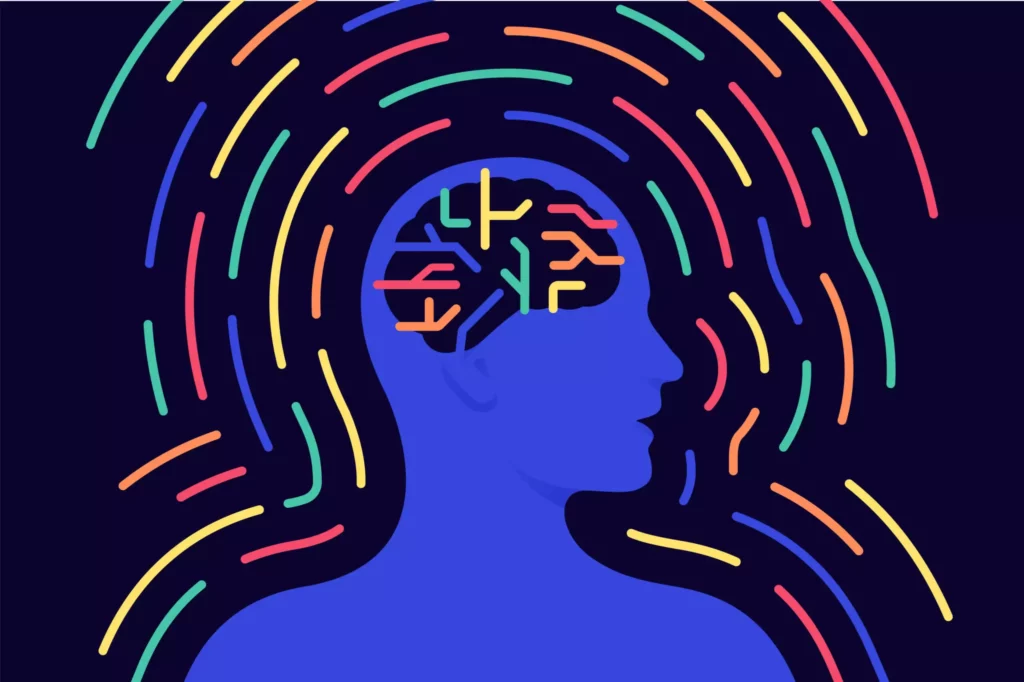Holistic Approaches to Managing Chronic Pain


Chronic pain can have a significant impact on an individual’s quality of life, affecting their physical and emotional well-being. Conventional treatments for chronic pain often involve medications that may provide temporary relief but come with potential side effects. As a result, many individuals are turning to holistic approaches to manage their chronic pain. These holistic methods focus on addressing the underlying causes of pain and promoting overall well-being. In this article, we will explore various holistic approaches to managing chronic pain and how they can be beneficial.
Content
Introduction
Chronic pain refers to persistent pain that lasts for an extended period, often for three months or more. It can stem from various conditions, such as arthritis, fibromyalgia, or nerve damage. Holistic approaches to managing chronic pain recognize that pain is not solely physical but can also be influenced by psychological and emotional factors. These approaches aim to provide a comprehensive and integrated solution for individuals seeking long-term relief from pain.
Understanding Chronic Pain
To effectively manage chronic pain, it is crucial to understand its underlying causes and mechanisms. Chronic pain can be influenced by factors such as inflammation, nerve damage, muscle tension, and emotional distress. By addressing these root causes, holistic approaches offer a more holistic and sustainable solution compared to merely focusing on symptom management.
The Mind-Body Connection

One essential aspect of holistic pain management is recognizing the intricate connection between the mind and the body. Emotional and psychological factors, such as stress, anxiety, and depression, can intensify pain perception. Mind-body techniques like cognitive-behavioral therapy (CBT), meditation, and relaxation exercises can help individuals develop coping mechanisms and reduce pain levels.
Nutrition and Chronic Pain
Proper nutrition plays a vital role in managing chronic pain. Certain foods have anti-inflammatory properties that can alleviate pain symptoms. Incorporating a balanced diet rich in fruits, vegetables, whole grains, and healthy fats can help reduce inflammation and promote overall well-being. Additionally, some individuals may benefit from avoiding trigger foods that can exacerbate pain, such as processed foods and those high in sugar and saturated fats.
Exercise and Movement Therapy
Engaging in regular exercise and movement therapy is essential for individuals with chronic pain. Physical activity helps strengthen muscles, improve flexibility, and release endorphins, the body’s natural painkillers. Low-impact activities like walking, swimming, or yoga can be particularly beneficial. It is important to start slowly and gradually increase intensity under the guidance of a healthcare professional or physical therapist.
Alternative Therapies for Pain Relief
Various alternative therapies have shown promise in managing chronic pain. These include acupuncture, chiropractic care, massage therapy, and herbal remedies. While the scientific evidence supporting these therapies may vary, many individuals report significant pain relief and improved well-being. It is crucial to consult with qualified practitioners and discuss the potential benefits and risks before embarking on any alternative treatment.
Stress Reduction Techniques
Stress can intensify chronic pain and hinder the healing process. Therefore, stress reduction techniques are a crucial component of holistic pain management. Practices such as deep breathing exercises, mindfulness meditation, and progressive muscle relaxation can help individuals relax, reduce stress levels, and alleviate pain. Additionally, engaging in activities that bring joy and promote relaxation, such as hobbies or spending time in nature, can contribute to overall well-being.
Sleep and Pain Management
Quality sleep is essential for managing chronic pain effectively. Sleep deprivation can amplify pain sensitivity and decrease pain tolerance. Establishing a consistent sleep routine, creating a comfortable sleep environment, and practicing relaxation techniques before bedtime can contribute to improved sleep quality. It may also be beneficial to consult with a healthcare professional if sleep disturbances persist.
Lifestyle Changes for Chronic Pain
Making certain lifestyle changes can have a positive impact on managing chronic pain. Quitting smoking, reducing alcohol consumption, and maintaining a healthy weight can all contribute to better pain management. Additionally, individuals should strive to maintain good posture, practice proper ergonomics, and take regular breaks during activities that may exacerbate pain.
Mindfulness and Meditation

Mindfulness and meditation practices can be powerful tools for individuals living with chronic pain. These practices involve focusing attention on the present moment and accepting one’s experiences without judgment. By cultivating a non-reactive and accepting attitude towards pain, individuals can reduce their suffering and improve their overall well-being.
Support Networks and Counseling
Living with chronic pain can be challenging, and individuals may benefit from seeking support from others who understand their experiences. Joining support groups, either in person or online, can provide a sense of community and emotional support. Additionally, counseling or therapy sessions can help individuals develop coping strategies, address emotional distress, and enhance their overall well-being.
Integrating Holistic Approaches with Traditional Medicine
Holistic approaches to managing chronic pain should be seen as complementary to traditional medical interventions. It is important to work with healthcare professionals to create an integrated treatment plan that combines conventional medicine with holistic practices. This collaborative approach ensures that individuals receive comprehensive care that addresses both the physical and emotional aspects of their pain.
Precautions and Considerations

While holistic approaches can be beneficial, it is important to approach them with caution and consider individual circumstances. Not all approaches may be suitable for everyone, and it is essential to consult with healthcare professionals before starting any new treatment or therapy. Additionally, individuals should be aware of potential interactions between holistic remedies and medications they are currently taking. See Also: GLP1.Guide – Your Comprehensive Resource for GLP-1 Therapy
Holistic Approach Success Stories
Numerous individuals have found relief from chronic pain through holistic approaches. By incorporating various strategies discussed in this article, individuals have reported reduced pain levels, improved functionality, and a better overall quality of life. While results may vary, exploring holistic options can offer new possibilities for individuals seeking long-term pain management.
Conclusion
In conclusion, holistic approaches to managing chronic pain offer individuals a comprehensive and integrative solution. By addressing the underlying causes of pain, focusing on the mind-body connection, and incorporating various strategies such as nutrition, exercise, and alternative therapies, individuals can find relief and improve their overall well-being. It is important to approach holistic approaches with caution, work with healthcare professionals, and create an integrated treatment plan that combines both conventional and holistic methods for optimal pain management.
Managing chronic pain requires a comprehensive and individualized approach. Holistic methods address the underlying causes of pain and promote overall well-being. By combining nutrition, exercise, alternative therapies, stress reduction techniques, and mindfulness practices, individuals can find relief and improve their quality of life. It is essential to work with healthcare professionals to develop an integrated treatment plan that incorporates both conventional and holistic approaches.
u003cstrongu003eCan holistic approaches completely eliminate chronic pain?u003c/strongu003e
Holistic approaches aim to manage chronic pain and improve overall well-being rather than providing a complete cure. Results may vary depending on individual circumstances and the specific approach used.
u003cstrongu003eAre holistic approaches safe to use alongside medications?u003c/strongu003e
It is important to consult with healthcare professionals before incorporating holistic approaches alongside medications. They can provide guidance on potential interactions and ensure the overall safety of the treatment plan.
u003cstrongu003eHow long does it take to experience the benefits of holistic approaches?u003c/strongu003e
The timeline for experiencing the benefits of holistic approaches can vary among individuals. Some people may notice improvements relatively quickly, while others may require more time. Consistency and patience are key.
u003cstrongu003eCan holistic approaches be used in conjunction with other pain management therapies?u003c/strongu003e
Yes, holistic approaches can be used alongside other pain management therapies. It is crucial to work with healthcare professionals to create an integrated treatment plan that addresses individual needs and preferences.
u003cstrongu003eAre there any potential side effects of holistic approaches?u003c/strongu003e
While holistic approaches are generally considered safe, it is important to be aware of potential side effects or risks associated with specific therapies or remedies. Consulting with qualified practitioners and healthcare professionals can help mitigate any potential risks.




